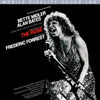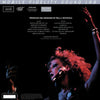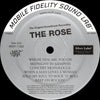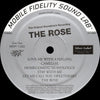







Bette Midler - The Rose - The Original Soundtrack Recording (MOFI Silver Label, Ultra Analog)
ORDER LIMITED TO ONE ITEM PER CUSTOMER
Bette Midler - lead vocals [click here to see more vinyl featuring Bette Midler]
Bill Champlin - background vocals
Donny Gerrard - background vocals
Amanda McBroom - harmony vocals
Norton Buffalo - harmonica & trombone, backing vocals
Danny Weis - guitar
Steve Hunter - guitar
Mark Leonard - bass guitar
Robbie Buchanan - keyboards
Pentti "Whitey" Glan - drums
Jerry Jumonville - saxophone
Mark Underwood - trumpet
Greg Prestopino - acoustic guitar
Bill Elliott - piano
Jon Sholle - electric guitar
Scott Chambers - bass
Harry Stinson - drums
Lincoln Mayorga - piano
String arranged by David Campbell
Arranged by Paul A. Rothchild
Written by Kenny Hopkins (A1), Charley Williams (A1), Tony Johnson (A2), Calvin Lewis (A4), Andrew Wright (A4), Gene Pistilli (A5), Sammy Hagar (A6), John Carter (A6), Hudson Whittaker (B1), Steve Hunter (B2), Jerry Ragovoy (B4), George David Weiss (B4), Beth Slater Whitson (B5), Leo Friedman (B5), Amanda McBroom (B6)
1LP, standard sleeve
Limited numbered edition
Original analog Master tape : Silver Label (Copy of original Mastertape)
Heavy Press : 180g
Record color : black
Speed : 33 RPM
Size : 12'’
Stereo
Live (A1 to B5) & Studio (B6)
Record Press : RTI
Label : MOFI
Original Label : Atlantic
Concerts recorded live during June & July 1978
Produced by Paul A. Rothchild
Mastered by Paul Stubblebine
Originally released in December 1959
Reissued in 2012
Tracks:
Side A:
- Whose Side Are You On
- Midnight In Memphis
- Concert Monologue
- When A Man Loves A Woman
- Sold My Soul To Rock 'N' Roll
- Keep On Rockin'
SideB:
- Love Me With A Feeling
- Camellia
- Homecoming Monologue
- Stay With Me
- Let Me Call You Sweetheart
- The Rose
Reviews :
“By the time you realize what's wrong with "The Rose," it will have you hooked anyhow. There are so many finely drawn episodes, so much brittle, raunchy humor, and such an unexpectedly alluring performance from Bette Midler in the title role that the movie maintains its momentum even after it's gone off the track. Its strengths may only be those of a good show-business soap opera, and its structure is disjointed beyond repair. But "The Rose" has an earnest, affecting character at its core. Even at its most preposterous, it never feels like a fraud."The Rose," which opens at the Ziegfeld today, seems to have been conceived as both a vehicle for Miss Midler and a way to tell a story like Janis Joplin's. So The Rose — who shares The Divine Miss M's odd habit of incorporating an article into her nickname — emerges as a creature of many contradictions. Although the story is supposedly set in 1969, Miss Midler is so thoroughly a product of the 70's that it becomes hard for her to handle certain aspects of the tale, notably those having to do with Rose's hippie abandon and her essential fragility. Miss Midler herself seems about as fragile as a bull elephant, no matter how stridently the screenplay insists that she eventually self-destruct.This screenplay, which takes the form of a crazy flashback, introduces Rose as a hard-living but weary performer who is agitating for a year's rest as the story begins. However, her manager, played with a fine ruthlessness by Alan Bates, is not a man who believes in allowing his meal ticket to take vacations. So Rose embarks on a series of spiteful, funny escapades, which seem to serve as both distress signals and her only way of letting off steam.Frederic Forrest, who would be the surprise hit of the movie if Miss Midler didn't herself have dibs on that position, plays a chauffeur whom Rose kidnaps on one particularly trying evening. And he has a sweet, stirring exchange with her when she finally hauls him back to her hotel at dawn. He pauses on the front steps to describe an adventure he once had on a Western river, but only one detail interests her. "Were you really," she asks with genuine astonishment, "alone for six days?"The early part of the story, which is at its most involving in the lengthy sequence that launches this romance, also presents a withering portrait of the music world — much nastier than the image offered by Barbra Streisand's "A Star Is Born," a movie "The Rose" resembles in its general blowsiness and enormous scale. One of the most memorable scenes has Rose barging, with an excess of flamboyance, into the dressing room of a country star, superbly played by Harry Dean Stanton. He winds up snubbing her with a cruelty that corresponds, perversely yet perfectly, to her own good-timey style of aggression.But Rose, though temporarily daunted, is still someone who'll crash any party. In fact, her feistiness emerges as one of her most lovable attributes. During this section of the film, she is also seen marching into a homosexual nightclub, a men's bathhouse and a truck-stop restaurant, where a nervous waitress tells her "We don't serve hippies." "Well, that's okay," smirks Rose, who loves rising to such occasions, "cause we don't eat 'em, neither."These incidents don't have much to do with one another, but they have a certain emotional coherence that is sorely missed once the screenplay begins burying Rose alive. By the time her demurely dressed lesbian lover appears on the scene, it has become painfully clear that if the kitchen sink could walk, somebody would have written it an entrance line, too. Rose's former heroin habit, and her high school misadventure with an entire football team, are suddenly brought into the act, paving the way for a finale that will amaze amateur pharmacologists everywhere. Rose combines heroin and pills into a miraculous potion that, somehow, allows her to belt out a song at the top of her lungs before dying an arty death only seconds later.Mark Rydell's direction, which has been unobtrusively effective until this point, suddenly turns the movie into something very like a wrestling match. Miss Midler succeeds beautifully in giving her character depth and dimension; she may even be a better actress than a singer, on the evidence of her first film role. But she cannot seem to muster the requisite pathos, and after a while one begins wondering why she should. "The Rose" may have four-hanky aspirations as a weeper, but Miss Midler has a vitality that belies all that, and makes the gloomy-ending machinations look ridiculous. It's much to her credit that she doesn't go down without a fight."The Rose," which finally becomes paralyzed by the discrepancies between its actress and her character, is full of wall-to-wall anachronisms. If anything, the setting seems more like the present than like 1969 — a year, if the movie is to be believed, without psychedelia, hippies, a war, long hair or short dresses. It is also a year without much rock-and-roll, since Miss Midler's singing, however ably it serves the movie's purposes, remains something of a different era.” The New York Times, November 7, 1979
Ultra Analog™ : The GAIN 2 Ultra Analog™ Series stems from the use of the Gain 2 system, mastered at half speed from the original master tapes where possible, capturing and uncovering as before undiscovered sonic information.
Half-speed mastering. In half-speed mastering, the whole process is slowed down to half of the original speed. A typical 33 1/3 rpm record is cut at 16 2/3 rpm. The source material is also slowed down (reducing the pitch in the process) meaning the final record will still sound normal when played back. Slowing the whole process down allows more time, which means the end result sounds better and is more efficient — allowing engineering to minimize the effects of inherent limitations within the vinyl format. The result is a more accurate and more open high-frequency response in the half speed vinyl when compared with a normal speed recording.
Ratings :
Discogs : 3.9 / 5


